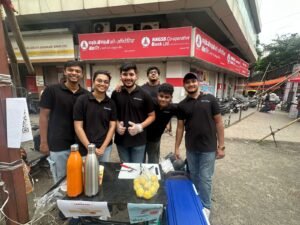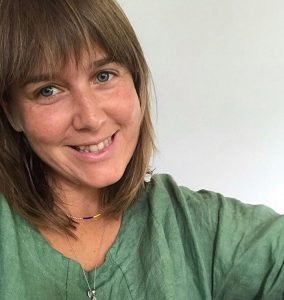
In the Middle of My Own Storm
Here’s a question for you: Do you know the Joker who juggles 3 balls in his hands? Have…
January 29, 2022
[dropcaps type=’square’ font_size=’80’ color=’#4a4a4a’ background_color=’#ffffff’ border_color=”]I[/dropcaps] am an aspiring entrepreneur and work in my family business with my father.I joined the Enterprise India Fellowship 2 Years back in January 2020 Jan. I was working on different projects and simultaneously grew interest in reading blogs and creating too. I got a question back then which I could relate to myself completely, how entrepreneurs achieve so much? How did they do it? We only see the good, the rosy and the successful parts of their journey. But just like me, they must have also struggled and failed to turn their ideas into reality. That’s when I decided to interview entrepreneurs and understand what’s beneath the surface, what’s under the water, what’s the hard work they did that we didn’t see.
I was continuously discussing this with one of my partners for 1 to 2 months and he connected me to four different entrepreneurs from four different continents. This enabled my curiosity to connect with them and ask the questions and write a blog. But, to be honest, I heard those same cliche practices from them as well, and I wanted to confirm if those could help someone like me who was just starting his entrepreneurial journey and get to the point where they are, and I started applying some of them in my life and guess what? Well, they are genuinely metamorphic. For the things I was sceptical about a year ago, now I can bet on them; they truly work.

The story starts with someone who shared various practices that she followed, “Anna Durward” is a social entrepreneur from Australia, who has a humanitarian heart, a strategic and visionary mind and a creative soul deeply connected to nature. She uses these attributes to successfully support individuals and communities to shift towards regeneration. She runs ‘Ocean ilo’, guiding individuals and communities to co-create a sustainable future.
 I was developing that business plan probably for about three months. So in those early days of starting something up for me, every day I would work on that business plan, it’s a lot of research and a lot of writing and a lot of Mind maps, I guess getting everything out and bringing some structure. Now I try to structure my days like nine to five. Yet I make sure that I do exercise within my day. So sometimes if I wake up late, then I’m going to go for a walk late, and then my day goes smaller. However in the beginning I didn’t do this. So it’s probably some advice that I would give. You can spend hours and hours working, but you’ll end up burning out. So while you’re so excited to get going, try and keep a structured day.
I was developing that business plan probably for about three months. So in those early days of starting something up for me, every day I would work on that business plan, it’s a lot of research and a lot of writing and a lot of Mind maps, I guess getting everything out and bringing some structure. Now I try to structure my days like nine to five. Yet I make sure that I do exercise within my day. So sometimes if I wake up late, then I’m going to go for a walk late, and then my day goes smaller. However in the beginning I didn’t do this. So it’s probably some advice that I would give. You can spend hours and hours working, but you’ll end up burning out. So while you’re so excited to get going, try and keep a structured day.
So I’m very lucky that I have quite a few mentors. So they’re not paid, mentors. They’re just people that I’ve met across my working journey in the last 10 years and you know, they have offered to support me. So really, I would turn to my mentors for discussion and challenges. Also, talk to my friends, a lot of my friends are social entrepreneurs. There’s a lot of help out there like business networking events where you can support each other, but I focused on my mentors, and just my friends and family in those challenging times and I still do it now,
I’ve never really gone and paid someone for support. But also I would and I had professional help like psychologists and a doctor as well, from the health point of view, like, I highly recommend that because it’s also just somebody that can listen to all your stresses about work. So if you’re every day, calling your family and friends and bothering them that’s not great, either, like if you’re constantly negative, and stressed and all of that.

It may be cliche but it’s meditation, it is so important as a leader and social entrepreneur to practice daily. The reason that I think its the most powerful tool for me is it stops the mind chatter because I am a high achiever, I am a perfectionist, I am a people pleaser, and my mind can go extremely fast and so many thoughts going through it, so when I go to meditate at night that stops. I come back to my body, and I come back to my heart.
I think like, I don’t know, everything. And I’m still young. And a lot of my mentors are a lot older than me, they’ve experienced a lot. They’ve worked internationally, they’ve worked in big corporations, they’ve done real high leadership jobs, you know, in government or with the United Nations and things like that. So I find that it’s really important to have those because they can provide guidance on things that I’ve never experienced before, you know, something might arise that’s new for me. And they can provide advice that I just, I can’t draw from experience. Maybe it’s around conflict, financials or whatever it may be. I also find a really important because they support you, and they believe in you. And they know when you’re doubting yourself, or when you’re having limited beliefs about yourself or your business, they really come in to say keep going. So for me, it’s like having a cheer squad. my mentors are like my cheer squad, but they’ll also say, Anna, you know, mentors are not really meant to give advice. They really meant to support you to come to the answers yourself. So that’s actually the definition of a mentor. It’s actually just to provide guidance. They’re not meant to tell you what to do. They’re meant to empower you to find the answers. So a lot of my mentors do that. They’ll ask me questions that are really powerful, that make me come to my own answer, particularly when I’m walking down the wrong path or something like that.

When you get out in this world, everything is complex, and when money gets involved, it gets even more complicated, and we can’t keep track of everything without keeping a record of them. So when a new challenge arises, and it comes to accountability, documenting is what saves you from getting you into huge complications.
I think this is advice that I use for myself, and that I would give somebody that is before an idea. The questions sat within me. What am I passionate about? And be really, really clear about that, like with the fine details. For example, I’m passionate about the environment.
There are actually specific things that I’m passionate about in relation to that. So having that really clear. What am I good at? What are my strengths? What are my assets? What are my qualifications? What are my experiences? what’s in my backpack? Or do I already have it in my backpack? And then I would also look at my weaknesses.
It’s pretty similar to a SWOT analysis. I found that really helpful but going more into the details of your qualifications and your experiences. What problems exist in the world that I’m passionate about? Coming up with a solution? and then recognising a good one.
Like, there are so many complexities in the world right now. And there are so many challenges, but what ones are you willing to fight for? Because when the days get hard, when you’re running your own business, you need to come back to that, like, why am I doing this? So I guess the WHY is really important. Figuring out your why, Why you want to be a social entrepreneur? What do you want to do? Like I said, to my friend the other day, I would fight for anything to do with Whales if the world was all falling apart like it is. So on the hard days I know I’m fighting for the environment, to make sure that their home is okay, that the ocean is okay for them.
[highlight color=” background_color=’#949494′] While Interviewing Anna, she gave such detailed answers that I felt how open-minded a person could be if you have the growth mindset (accepting your flaws and working on them) this was not something in the answer but it is the realization I had while interviewing. Apart from this from the time of interview to date, I am trying to practice the things she practised herself at the beginning of the years of her journey. But among all the practices I followed religiously is DOCUMENTING. [/highlight]


Let's Enterprise is a pioneering educational institution that empowers students with hands-on business skills through its unique UG-M.E.D. program. With campuses in Pune and Goa, it bridges the gap between traditional learning and real-world experience, shaping the future of tomorrow's entrepreneurs.
Discover how our first-year students are actively engaging in real-world business projects, guided by facilitator Sharjeel Shaikh.